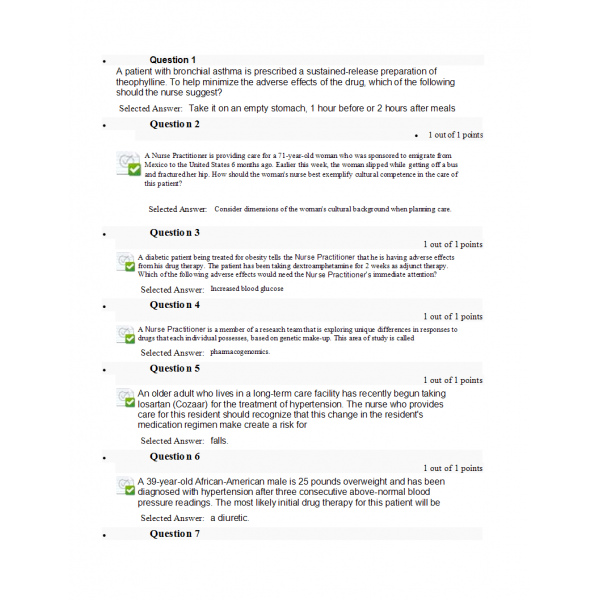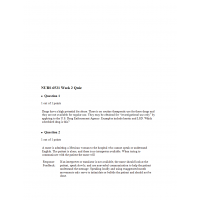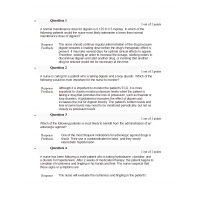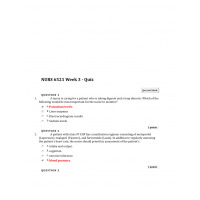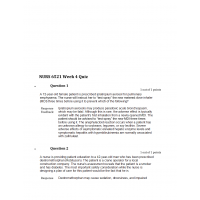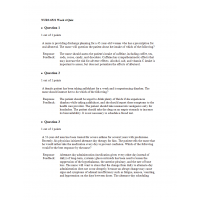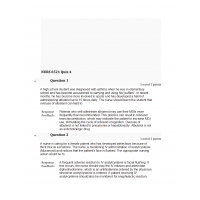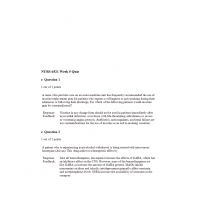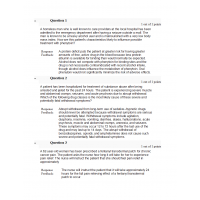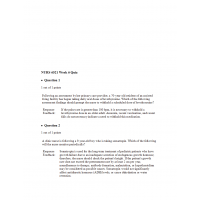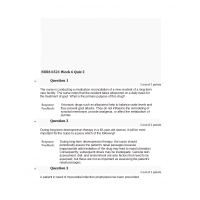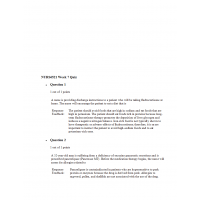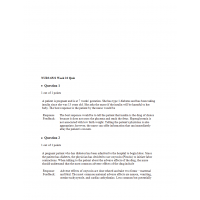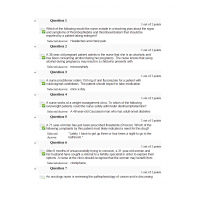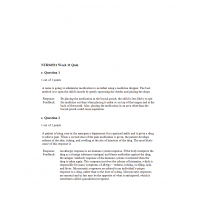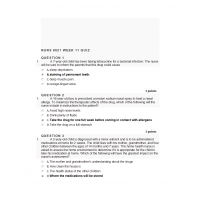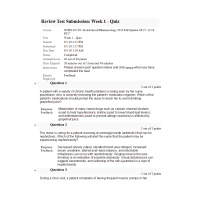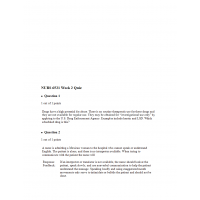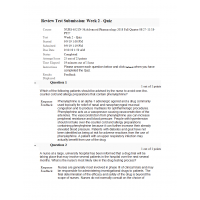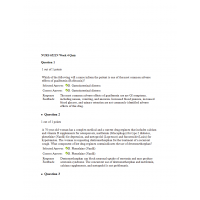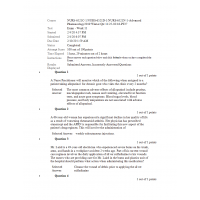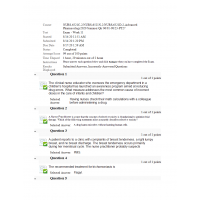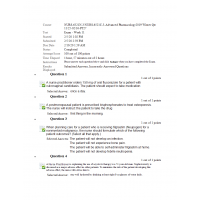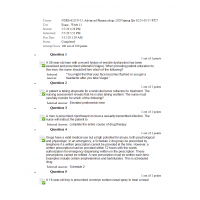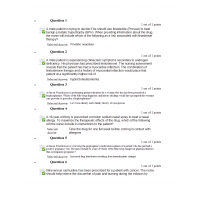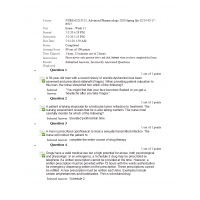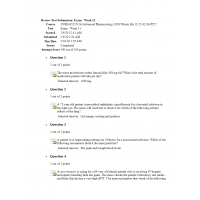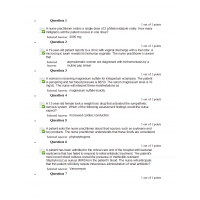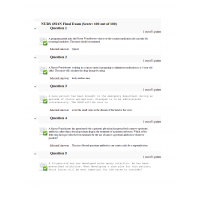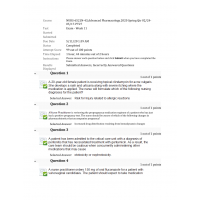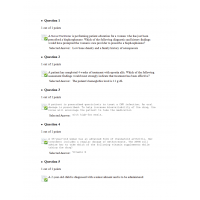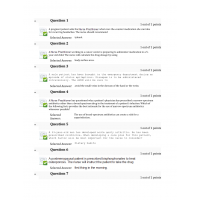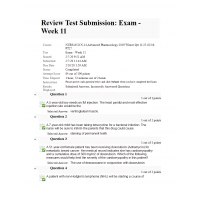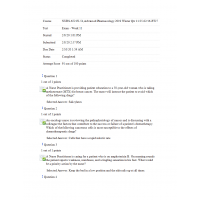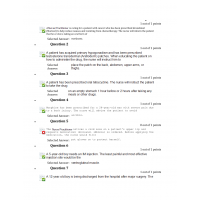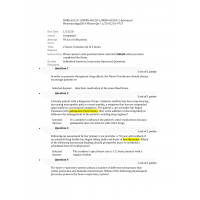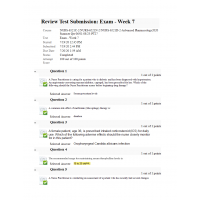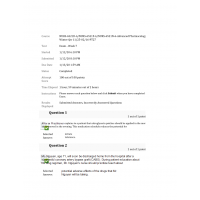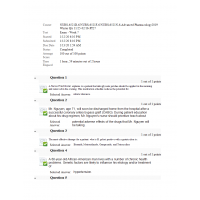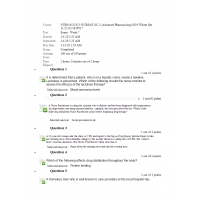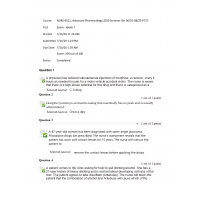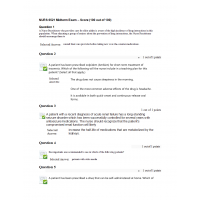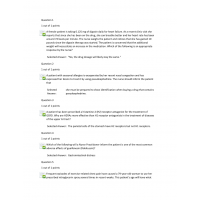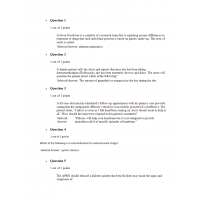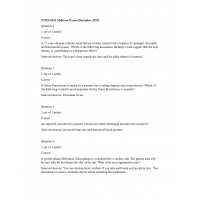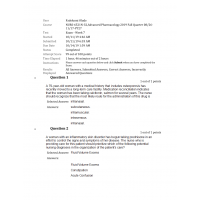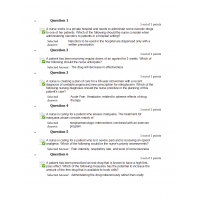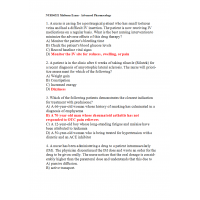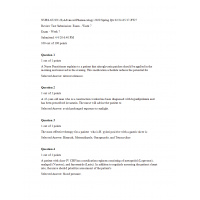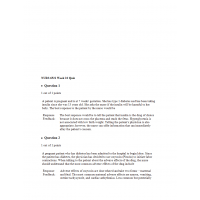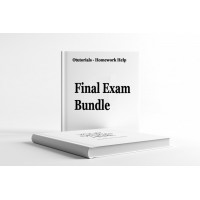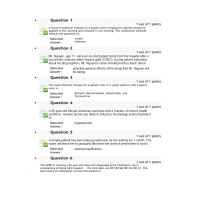NURS 6521N Midterm Exam - 100/100 Points
1. A patient with bronchial asthma is prescribed a sustained-release preparation of theophylline. To help minimize the adverse effects of the drug, which of the following should the nurse suggest?
2. A Nurse Practitioner is providing care for a 71-year-old woman who was sponsored to emigrate from Mexico to the United States 6 months ago. Earlier this week, the woman slipped while getting off a bus and fractured her hip. How should the woman's nurse best exemplify cultural competence in the care of this patient?
3. A diabetic patient being treated for obesity tells the Nurse Practitioner that he is having adverse effects from his drug therapy. The patient has been taking dextroamphetamine for 2 weeks as adjunct therapy. Which of the following adverse effects would need the Nurse Practitioner's immediate attention?
4. A Nurse Practitioner is a member of a research team that is exploring unique differences in responses to drugs that each individual possesses, based on genetic make-up. This area of study is called
5. An older adult who lives in a long-term care facility has recently begun taking losartan (Cozaar) for the treatment of hypertension. The nurse who provides care for this resident should recognize that this change in the resident's medication regimen make create a risk for
6. A 39-year-old African-American male is 25 pounds overweight and has been diagnosed with hypertension after three consecutive above-normal blood pressure readings. The most likely initial drug therapy for this patient will be
7. A 62-year-old man is admitted to the hospital with a diagnosis of chest pain. He has an order for 0.3 mg of sublingual nitroglycerin prn for chest pain. Which of the following actions should the nurse do first when he complains of chest pain?
8. A Nurse Practitioner working for a drug company is involved in phase III drug evaluation studies. Which of the following might the Nurse Practitioner be responsible for during this stage of drug development?
9. After a recent history of shortness of breath that has become increasingly severe, a woman has been prescribed ipratropium by MDI while she undergoes a diagnostic workup. What patient teaching should the nurse provide to this patient?
10. Which of the following patients is most likely to benefit from the administration of an adrenergic agonist?
11. A 73-year-old woman has scheduled an appointment with her nurse practitioner to discuss her recurrent constipation. The woman states that she experiences constipation despite the fact that she takes docusate on a daily basis and performs cleansing enemas several times weekly. How should the nurse best respond to this patient's statements?
12. A Nurse Practitioner who provides care in a busy clinic is aware of the high incidence and prevalence of hyperlipidemia and the consequent need for antihyperlipidemics in many patients. Treatment of high cholesterol using statins would be contraindicated in which of the following patients?
13. During a clinic visit, a patient complains of having frequent muscle cramps in her legs. The nurse's assessment reveals that the patient has been taking over-the-counter laxatives for the past 7 years. The nurse informed the patient that prolonged use of laxatives
14. A 29-year-old female patient has been prescribed orlistat (Xenical) for morbid obesity. The nurse is providing patient education concerning the drug. An important instruction to the patient would be to
15. A 70-year-old man who enjoys good health began taking low-dose aspirin several months ago based on recommendations that he read in a magazine article. During the man's most recent visit to his care provider, routine blood work was ordered and the results indicated an unprecedented rise in the man's serum creatinine and blood urea nitrogen (BUN) levels. How should a nurse best interpret these findings?
16. The Nurse Practitioner is prescribing Salmeterol (Serevent) inhaler for a patient with asthma. What instructions would be correct to provide the patient?
17. You are seeing a 55 year old patient recently diagnosed with a bleeding ulcer. What should be the initial treatment choice for this patient?
18. A patient has been prescribed a drug that can be self-administered at home. Which of the following would be the most important information for the nurse to relate to the patient concerning self-administration of a drug?
19. A man who smokes one pack of cigarettes daily has been diagnosed with chronic bronchitis. He has been prescribed theophylline by his family doctor. What effect will the patient's smoking status have on the therapeutic use of theophylline?
20. The Nurse Practitioner is treating a patient that takes frequent doses of antacids for his heartburn and is also taking an enteric coded aspirin. What instructions should be provided to the patient?
21. A 22 year old patient is transitioning from oral agents to insulin. He will be taking 20 units of lantus at bedtime and regular insulin before meals. What instructions should the NP provide about the timing and dose of regular insulin?
22. A patient is being treated for respiratory infection. He is a recovering alcoholic and has impaired liver function. The nurse will instruct the patient to be especially cautious when taking
23. A 68-year-old man complains of a chronic, nonproductive cough. He states that he has to have relief, that he has been coughing every 2 to 3 minutes, and he is worn out. Dextromethorphan is prescribed for him. Before he leaves the clinic he asks how long it will take for the medicine to work. The nurse will advise him that he should experience therapeutic effects in
24. A 47-year-old woman has been diagnosed with open-angle glaucoma. Pilocarpine drops are prescribed. The nurse's assessment reveals that the patient has worn soft contact lenses for 15 years. The nurse will instruct the patient to
25. A patient has GERD and is taking ranitidine (Zantac). She continues to have gastric discomfort and asks whether she can take an antacid. Which of the following is an appropriate response by the nurse?
26. A patient has a history of tonic-clonic seizures that have been successfully treated with phenytoin (Dilantin) for several years. Phenytoin achieves a therapeutic effect by
27. A patient has been prescribed a histamine-2 (H2) receptor antagonist for the treatment of GERD. Why are H2RAs more effective than H1 receptor antagonists in the treatment of diseases of the upper GI tract?
28. A teenage boy has undergone a diagnostic workup following several months of persistent, bloody diarrhea that appears to lack an infectious etiology. The boy has also experienced intermittent abdominal pain and has lost almost 15 pounds this year. Which of the following medications is most likely to treat this boy's diagnosis?
29. A 79-year-old patient in a long-term care facility is to receive an intravenous fat emulsion. Which of the following lab values would be a priority for the nurse to assess before administration?
30. A Nurse Practitioner is providing discharge planning for a 45-year-old woman who has a prescription for oral albuterol. The Nurse Practitioner will question the patient about her intake of which of the following?
31. An unconscious patient has been brought to the hospital, and the Nurse Practitioner has prescribed a life-saving drug to be administered parenterally. Which of the following methods would be the most appropriate for the nurse to use when administering the medication?
32. A nurse practitioner understands when prescribing a medication that there are certain questions to address. Check all that apply.
33. A 70-year-old woman with a history of atrial fibrillation takes digoxin and verapamil to control her health problem. Verapamil achieves a therapeutic effect by
34. A Nurse Practitioner has been administering a drug to a patient intramuscularly (IM). The physician discontinued the IM dose and wrote an order for the drug to be given orally. The Nurse Practitioner notices that the oral dosage is considerably higher than the parenteral dose and understands that this due to
35. Drugs have a high potential for abuse. There is no routine therapeutic use for these drugs and they are not available for regular use. They may be obtained for "investigational use only" by applying to the U.S. Drug Enforcement Agency. Examples include heroin and LSD. Which scheduled drug is this?
36. A 22-year-old male college senior has lived with a diagnosis of Crohn's disease for several years and has undergone several courses of treatment with limited benefit. Which of the following targeted therapies has the potential to alleviate the symptoms of Crohn's disease?
37. The APRN is caring for a patient taking a calcium channel blockers for hypertension. The APRN should monitor the patient for what common side effects of this medication?
38. The APRN is seeing Mrs. Smith, age 77, who is here for follow up of hypertension, dyslipidemia, and depression. What should you consider during her follow-up?
39. A 55-year-old man's hypertension has not responded adequately to his current medication regimen consisting or an ACE inhibitor, a beta-blocker and a thiazide diuretic. As a result, he will soon begin taking hydralazine (Apresoline) in addition to his existing antihypertensives. The addition of this medication to his regimen means that the nurse must prioritize which of the following nursing actions?
40. A Nurse Practitioner is discussing with a patient the efficacy of a drug that his physician has suggested, and he begin taking. Efficacy of a drug means which of the following?
41. A Nurse Practitioner is providing care for a patient who suffered extensive burns to his extremities during a recent industrial accident. Topical lidocaine gel has been ordered to be applied to the surfaces of all his burns in order to achieve adequate pain control. When considering this order, the Nurse Practitioner should be aware that
42. A Nurse Practitioner is teaching an older adult patient about polypharmacy. Which of the following statements best describe this term?
43. A Nurse Practitioner is caring for a female patient who has developed atelectasis because of thick mucus secretions. The Nurse Practitioner is monitoring IV administration of acetylcysteine (Mucomyst) and notices that the patient's face is flushed. The appropriate nursing action would be to
44. Which statement is FALSE regarding the treatment of hyperthyroidism?
45. Topical inhaled alpha adrenergic blocking agents or nasal vasoconstricting decongestants should not be used chronically (>5 days) because they can cause
46. A 58-year-old man is prescribed dicyclomine (Bentyl) for irritable bowel syndrome. In which of the following conditions is dicyclomine therapy contraindicated?
47. A 58-year-old man is admitted to the emergency department. A diagnosis of severe digoxin toxicity is made. Bradycardia is present, and an electrocardiogram (ECG) confirms toxicity. The nurse will administer which of the following drugs?
48. A 77-year-old patient has a long-standing history of hypertension, a health problem that is being treated with metoprolol and a thiazide diuretic. Before administering the 8 AM dose of these medications, what assessments should the nurse perform and document? (Select all that apply.)
49. A 67-year-old man is admitted to the hospital with pneumonia. He reports to the nurse that he has chronic arthritis and circulation problems. Further assessment by the nurse reveals that the patient has a history of mild hypertension. He explains that he owns a business and lives alone. The nurse determines that he is within the normal weight range for his height and age but has a fondness for spicy foods and sweets. Which of the mentioned patient variables will have the greatest impact on the effectiveness of the patient's drug therapy?
50. An elderly patient with a history of congestive heart failure has been admitted to hospital with failure to thrive and admission blood work reveals a hemoglobin level of 6.9 g/dL. The care team has consequently administered two units of packed red blood cells, but auscultation of the client's lungs now reveals diffuse crackles. Administration of what drug is likely to resolve the patient's pulmonary edema?
51. A female patient has been taking zafirlukast for a week and is experiencing diarrhea. The nurse should instruct her to do which of the following?
52. A 62-year-old woman has been prescribed a fentanyl transdermal patch for chronic cancer pain. The patient asks the nurse how long it will take for her to experience pain relief. The nurse will instruct the patient that she should feel pain relief in approximately
53. A patient has been prescribed a histamine-2 (H2) receptor antagonist for the treatment of GERD. Why are H2RAs more effective than H1 receptor antagonists in the treatment of diseases of the upper GI tract?
54. Which of the following patients should be advised by the Nurse Practitioner to avoid over-the-counter cold and allergy preparations that contain phenylephrine?
55. A Nurse Practitioner has been administering a drug to a patient intramuscularly (IM). The physician discontinued the IM dose and wrote an order for the drug to be given orally. The Nurse Practitioner notices that the oral dosage is considerably higher than the parenteral dose and understands that this due to
56. A male patient is to begin treatment for pneumonia with an albuterol (Ventolin) inhaler. The nurse will advise the patient that he will most likely experience which of the following common adverse effects of the drug?
57. A Nurse Practitioner is instructing a patient who was recently diagnosed with multiple sclerosis about dantrolene (Dantrium). The patient is a 38-year-old-male and the foreman for a construction company. In order to minimize one important adverse effect of the drug, the nurse will give the patient which of the following instructions?
58. A teenage boy has undergone a diagnostic workup following several months of persistent, bloody diarrhea that appears to lack an infectious etiology. The boy has also experienced intermittent abdominal pain and has lost almost 15 pounds this year. Which of the following medications is most likely to treat this boy's diagnosis?
59. A resident of a long-term care facility receives 12.5 mg metoprolol (Lopressor) at 8 AM and 8 PM daily. Before administering this drug, the nurse should perform and document what assessments?
60. A Nurse Practitioner is teaching an older adult patient about polypharmacy. Which of the following statements best describe this term?
61. A patient is bothered with nighttime episodes of bronchoconstriction related to asthma. Which of the following medications can be administered to decrease the nighttime episodes and prevent asthma attacks?
62. A patient with seasonal allergies is exasperated by her recent nasal congestion and has expressed her desire to treat it by using pseudoephedrine. The nurse should inform the patient that
63. Mr. Lacuna is an 83-year-old resident of a long-term care facility who has a diagnosis of moderate Alzheimer disease. Mr. Lacuna's physician recently prescribed oral rivastigmine, but he was unable to tolerate the drug due to its gastrointestinal effects. As a result, he has been ordered the transdermal patch form of the medication. When administering this form of rivastigmine, the nurse should
64. A patient receives 25 units of NPH insulin at 7.AM. At what time of day should the nurse advise the patient to be most alert for a potential hypoglycemic reaction?
65. A patient is being treated for respiratory infection. He is a recovering alcoholic and has impaired liver function. The nurse will instruct the patient to be especially cautious when taking
66. A Nurse Practitioner is providing patient education to a 35-year-old man who has been prescribed clonidine (Catapres) as part of step 2 antihypertensive therapy. The Nurse Practitioner should anticipate that the drug will be administered
67. A 33-year-old woman has irritable bowel syndrome (IBS). The physician has prescribed simethicone (Mylicon) for her discomfort. Which of the following will the nurse monitor most closely during the patient's drug therapy?
68. A Nurse Practitioner is caring for a 61-year-old man who has had a severe attack of gout while in the hospital for food poisoning. The Nurse Practitioner administers colchicine intravenously in order to
69. A patient has been prescribed an oral drug that is known to have a high first-pass effect. Which of the following measures has the potential to increase the amount of the free drug that is available to body cells?
70. An older adult who lives in a long-term care facility has recently begun taking losartan (Cozaar) for the treatment of hypertension. The nurse who provides care for this resident should recognize that this change in the resident's medication regimen make create a risk for
71. To maximize the therapeutic effect of diphenoxylate HCl with atropine sulfate, the nurse will instruct the patient to take the medication
72. Decongestants are recommended to use in which of the following patients?
73. A patient with a variety of chronic health problems is being seen by her nurse practitioner, who is currently reviewing the patient's medication regimen. Which of the patient's medications should prompt the nurse to teach her to avoid drinking grapefruit juice?
74. The Nurse Practitioner is following up on a patient who is experiencing acute asthma problems. Albuterol (Proventil) by metered-dose inhaler (MDI) has been ordered as treatment. Which patient response would indicate to the family nurse practitioner that the patient understands how to take the medication?
75. A Nurse Practitioner is providing care for a 71-year-old woman who was sponsored to emigrate from Mexico to the United States 6 months ago. Earlier this week, the woman slipped while getting off a bus and fractured her hip. How should the woman's nurse best exemplify cultural competence in the care of this patient?
76. A Nurse Practitioner is overseeing the care of a young man whose ulcerative colitis is being treated with oral prednisone. Which of the following actions should the Nurse Practitioner take in order to minimize the potential for adverse drug effects and risks associated with prednisone treatment?
77. A 53-year-old man has been treated for severe asthma for several years with prednisone. Recently, his physician initiated alternate-day therapy for him. The patient tells the nurse that he would rather take the medication every day to prevent confusion. Which of the following would be the best response by the nurse?
78. A diabetic patient being treated for obesity tells the Nurse Practitioner that he is having adverse effects from his drug therapy. The patient has been taking dextroamphetamine for 2 weeks as adjunct therapy. Which of the following adverse effects would need the Nurse Practitioner's immediate attention?
79. Which of the following patients should be advised by the Nurse Practitioner to avoid over-the-counter cold and allergy preparations that contain phenylephrine?
80. A 22 year old patient is transitioning from oral agents to insulin. He will be taking 20 units of lantus at bedtime and regular insulin before meals. What instructions should the NP provide about the timing and dose of regular insulin?
81. What critical piece of information is missing from the following medication order: Amoxicillin 250 mg every 8 hours?
82. A Nurse Practitioner is the cardiac care unit is preparing to hang an intravenous dose of dofetilide (Tikosyn) for a patient who has just been admitted. What is the most likely goal of this intervention?
83. A Nurse Practitioner is teaching a patient about his newly prescribed drug, colchicine, for gout. The Nurse Practitioner will instruct the patient to avoid which of the following foods?
84. Which of the following is TRUE about long acting beta agonist use in asthma patients?
85. A Nurse Practitioner is caring for a patient who is taking digoxin and a loop diuretic. Which of the following would be most important for the Nurse Practitioner to monitor?
86. A 70-year-old man with diabetes mellitus is taking metoprolol (Lopressor) to manage his hypertension. The nurse would be sure to instruct the patient to
87. Topical inhaled alpha adrenergic blocking agents or nasal vasoconstricting decongestants should not be used chronically (>5 days) because they can cause
88. A patient with mild low back pain has been advised to take acetaminophen. The nurse will inform him that excessive intake of acetaminophen may result in
89. A 77-year-old man's chronic heart failure is being treated with a regimen of quinapril (Accupril) and furosemide (Lasix). Which of the following assessment findings would suggest that the loop diuretic is contributing to a therapeutic effect?
90. Shirley, age 58, has been diabetic for 7 years. Her blood pressure for the last three office visits have been 154/100, 144/94, and 144/90. What would you prescribe today during her routine office visit?
91. A Nurse Practitioner is caring for a male patient who has a diagnosis of coronary artery disease (CAD). His drug therapy includes lovastatin. Because the patient has a history of severe renal disease, the nurse will assess for which of the following?
92. A patient with diabetes has had a cough for 1 week and has been prescribed a cough syrup (an expectorant). What special instructions should the nurse include in the patient teaching for this situation?
93. A resident of a long-term care facility receives 12.5 mg metoprolol (Lopressor) at 8 AM and 8 PM daily. Before administering this drug, the nurse should perform and document what assessments?
94. A patient has been prescribed lovastatin for a high cholesterol level. The nurse's teaching plan will include a basic explanation of how the drug produces its therapeutic effect. The nurse will explain that lovastatin lowers cholesterol levels because it
95. A patient comes to the clinic asking for help to quit drinking alcohol. She has a 21-year history of heavy drinking and is worried about developing cirrhosis of the liver. The patient agrees to take disulfiram (Antabuse). The nurse will teach the patient that the combination of alcohol and Antabuse will cause which of the following?
96. A 72-year-old female patient is prescribed ipratropium aerosol for pulmonary emphysema. The nurse will instruct her to "test spray" the new metered-dose inhaler (MDI) three times before using it to prevent which of the following?
97. A 22-year-old male college senior has lived with a diagnosis of Crohn's disease for several years and has undergone several courses of treatment with limited benefit. Which of the following targeted therapies has the potential to alleviate the symptoms of Crohn's disease?
98. A 70-year-old woman with a history of atrial fibrillation takes digoxin and verapamil to control her health problem. Verapamil achieves a therapeutic effect by
99. A Nurse Practitioner is caring for a patient who has recently moved from Vermont to south Florida. The patient has been on the same antihypertensive drug for 6 years and has had stable blood pressures and no adverse effects. Since her move, however, she reports "dizzy spells and weakness" and feels that the drug is no longer effective. The Nurse Practitioner suspects that the change in the effectiveness of the drug is related to
100. A child with sinusitis has been on antibiotics for seven days and his symptoms are not improving. All of the following are options to prescribe for the patient now EXCEPT:
| Institution & Term/Date | |
| Term/Date | Walden University |
NURS 6521N Midterm Exam 1 - (100 out of 100)
- Product Code: 2020
- Availability: In Stock
-
$30.00
Related Products
Tags: NURS 6521

